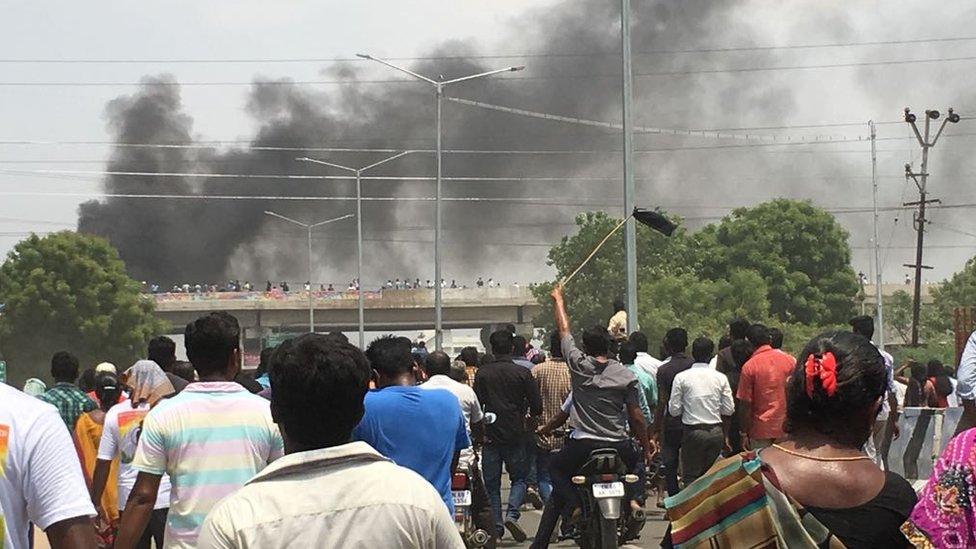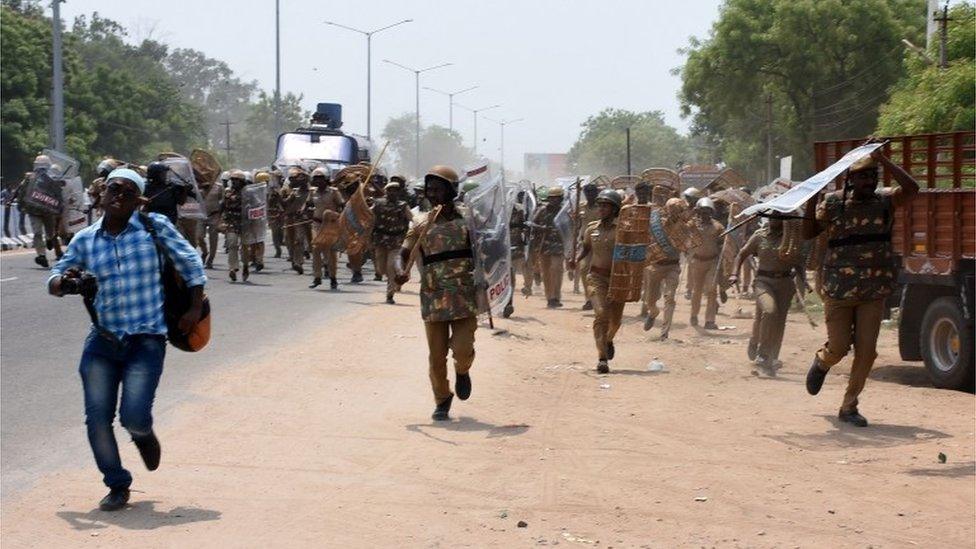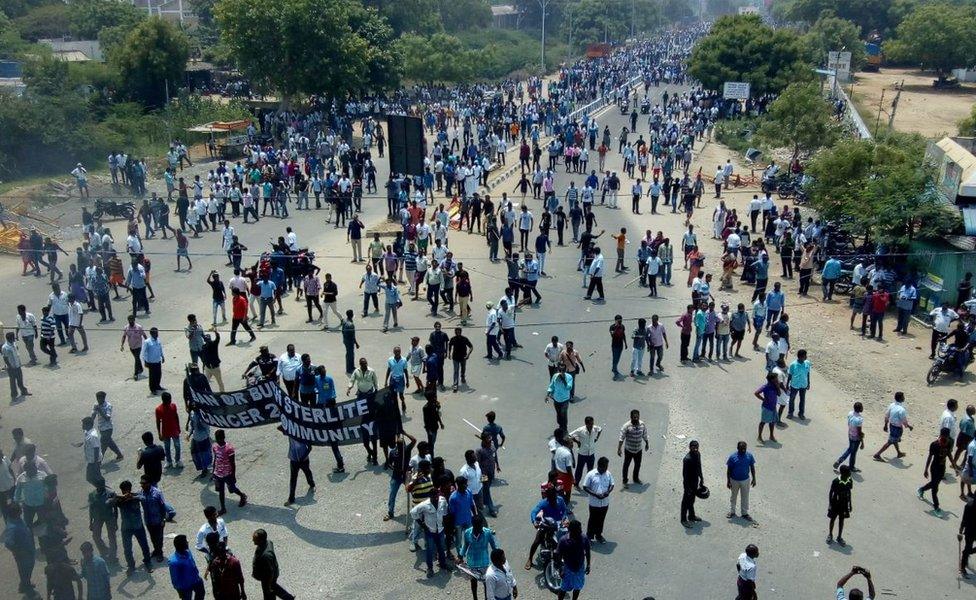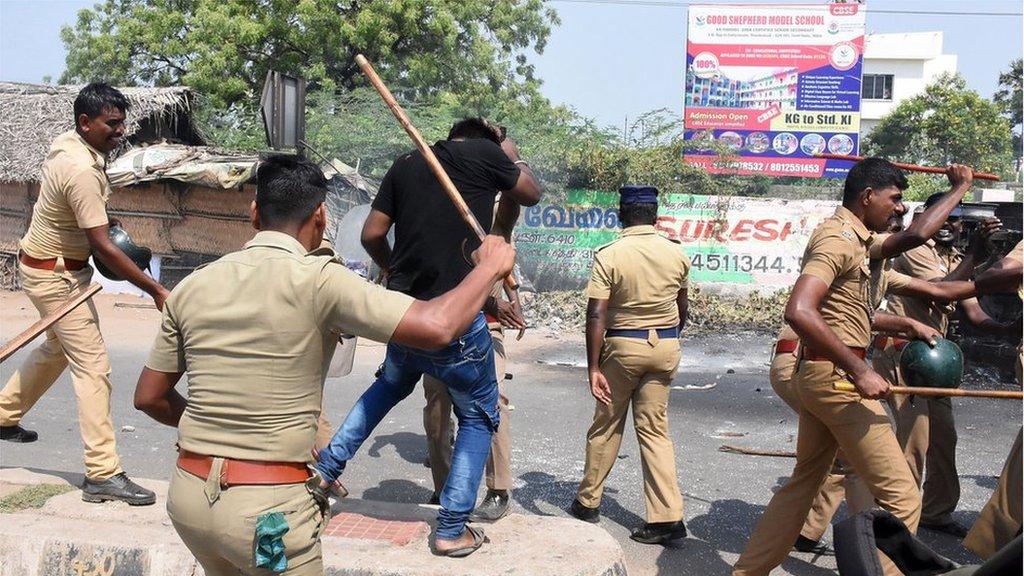The grassroots movement that shut down an Indian copper plant
- Published

At least 13 people died amid protests in Tamil Nadu on May 22
On Monday, the southern Indian state of Tamil Nadu ordered the shut down of a controversial copper plant that locals had been protesting against for more than 20 years. The order from the state government came days after police shot at a large crowd of protesters, killing at least 13 people.
We take a look at the grassroots movement that mobilised tens of thousands of residents and led to the shut down of the factory.
Who are the protesters?
Residents of Tuticorin, a port city in the state, have alleged that the copper plant has caused significant environmental damage, including air pollution and groundwater contamination.
Mining firm Vedanta, which owns the copper smelter, has consistently denied these charges. The company has called the closure of the plant, which it has operated for more than 22 years, an "unfortunate development".
The 400,000 tonne-capacity plant has been mired in controversy ever since it was first proposed in 1995.
It was initially rejected a home in three other Indian states, external - Maharashtra, Gujarat and Goa - due to its "highly polluting nature" before being approved by Tamil Nadu, according to the Centre of Science and Environment (CSE).
The announcement of the project sparked strong opposition from many residents, who joined forces with environmental associations to form the beginnings of the anti-Sterlite movement.
The copper smelter was built in 1996 - after it was granted an environmental clearance from Tamil Nadu's pollution board and environment ministry despite public outcry.

Protesters accuse the copper plant of causing environmental damage
What sustained the movement for so long?
Nityanand Jayaram, an environmental activist who has been involved in the movement since 2003, told the BBC there was always "latent anger" against the plant, which he said had consistently lied to the people about the damage being caused to the environment.
"The company continually dismissed people's concerns and so they felt like they weren't being heard, and that is why the anger never died down," he said.
This was not helped by the fact that "Sterlite used government machinery to help themselves, while consistently denying any environmental impact on the people in the region," Mr Jayaram added.
He said that there were consistent incidents, including gas leaks and the blatant violation of planning regulations, which would galvanise anger against the company all over again.
Tamil Nadu is no stranger to sustained mass movements against corporations and government projects. In 2016, consumer giant Unilever reached a settlement with hundreds of former employees, external, following a long dispute over alleged mercury poisoning at its factory in Kodaikanal. Similarly, residents of Kudankulam carried out protests against the construction and operation of a nuclear power plant, external for more than 20 years.
BBC News Tamil's correspondent Muralidharan Kasi Vishwanathan said part of the reason for this was the high levels of literacy in the state, which meant people were more engaged with issues.
He also said environmental movements in Tamil Nadu were strong, involved people from every strata of society and enjoyed massive popular support.
"In the case of this Sterlite protest for instance, small shop owners, traders and even fishermen were involved, right from the start. In 1997, two vessels from Australia carrying copper ore was trying to dock at the Tuticorin port when fishermen surrounded them with their boats, so that they could not deliver the sterlite there.
What prompted the shut down?
On 22 May residents of Tuticorin flooded the streets to mark 100 days of protest against Sterlite. But the months-long peaceful demonstrations took a violent turn when police clashed with protesters. Police said they had to open fire when a large crowd stormed district government headquarters. At least 13 people were killed and many were critically injured.
Police and state government officials justified firing live ammunition into the "unruly" crowd of protesters. However the police action sparked a national outcry with many calling the incident murder.
Faced with mounting public pressure, state officials ordered the closure of the plant three days later.

Police say the protesters turned "unruly" and were forced to open fire
Is this really the end of Sterlite Copper?
It's difficult to say. This is not the first time the plant has been shut. In fact it is the fourth instance that it has had to halt operations due to incidents like gas leaks, air pollution and groundwater contamination.
And while protesters in Tuticorin have reacted with relief and jubilation at the announcement of a permanent shut down, critics and other activists are not as optimistic.
Mr Jayaram feels the wording of the shutdown order in its current form will not survive a legal challenge. He said it makes no mention of the plant's many violations over the years and alleged that the pollution control board had a "history of drafting weak legislation that are designed to fail in court".
The chief of Vedanta's India copper business, P Ramnath has already said the company plans to "legally fight any attempt to close the plant", external.
How will the closure affect the Indian economy?
The Sterlite plant in Tamil Nadu is the seventh largest copper smelter in the world, and accounts for 36% of India's copper demands. This means that a closure of the plant could lead to a shortage of copper in the country and temporarily raise prices. An attempt to make up for the shortage by importing the metal could potentially cost India around $3bn (£2.2bn) per year.
Additionally, the jobs of around 3,500 people - the number of company employees in Tamil Nadu - are at risk. A Sterlite engineer in the state told BBC Tamil that similar jobs in other copper plants in India are limited in number. "Many employees are in mental agony as they are all in a state of uncertainty," he said.
Read this report on BBC News Tamil.
Correction: This article clarifies the date that Unilever reached a settlement with former employees. The Kodaikanal plant was shut in 2001.
- Published25 May 2018

- Published2 April 2013